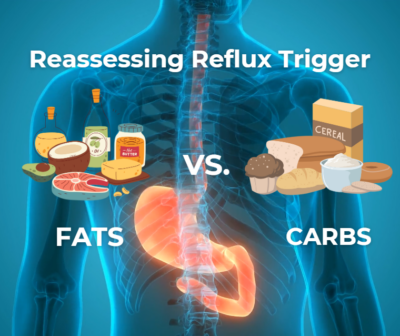 Reassessing Reflux Triggers: Fats vs. Carbs
Reassessing Reflux Triggers: Fats vs. Carbs
If you are familiar with my work, this might be a reminder.
Someone recently posted a question: “Don’t fats loosen the LES or lower esophageal sphincter causing reflux?”
For decades, dietary recommendations for GERD, gastroesophageal reflux disease, have focused on reducing fat intake. This is based on the 1973 study 1 suggesting that fats lower LES pressure and could lead to increased reflux episodes.
However, recent research challenges this view, highlighting fermentable carbohydrates as a more significant contributor to reflux.
Here’s what the evidence tells us:
Carbohydrates and Reflux:
Fermentation and Gas Production: Bacteria in the gut ferment certain carbohydrates and produce gas. When you consume too many dietary carbs coupled with poor digestion, excessive gas builds up in your intestines. This leads to increased intragastric pressure in the stomach, which promotes reflux events. Previously, these events have been referred to as “transient LES relaxations.”
Intragastric pressure pushes the LES valve to open: When measured by a technique called manometry, it appears that the LES is “relaxing” during reflux. But this newer idea posits that intragastric gas pressure from fermentation is “pushing it to open,” like dropping a Mentos candy in a Coke bottle. I developed this theory and wrote about it in my books, Heartburn Cured and Fast Tract Digestion Heartburn.
Fats are NOT the problem:
- High-fat meals did not increase reflux when calorie content was controlled. Therefore, “it is inappropriate to advise GERD patients to reduce the fat content of their meals for symptom relief.” 2
- The calorie content is more important than the fat content 3
- Several more studies confirm that fats don’t cause reflux 4, 5, 6
-
Carbohydrates are the problem:
- Studies show that dietary carbohydrate restriction is effective in relieving GERD symptoms and reducing esophageal acid exposure 7, 8
- A more extensive study of 144 obese women with GERD resolved their GERD symptoms and stopped medication after 10 weeks on a high-fat, low-carb diet 9
-
-
A Better Way to Manage Reflux
This research challenges the long-standing focus on fat reduction and supports a new dietary approach: limiting fermentable carbohydrates. The Fast Tract Diet offers a science-backed solution that targets the real dietary triggers of reflux for both acid and non-acid reflux (LPR).
Not only that, the Fast Tract Diet addresses gut dysbiosis, including:
- SIBO (hydrogen and/or hydrogen sulfide gas)
- IMO (methane gas)
- Other forms of dysbiosis (mixed gases and other end products)
This is because fermentable carbs, especially the five types targeted in the Fast Tract Diet, are the primary fuel source of gut microbes, thus potentially driving overgrowth and excessive gas production.
Overfed gut bacteria produce excessive amounts of gas. Remember, 30 grams of unabsorbed carbohydrates allows bacteria to produce more than ten liters of hydrogen gas. 10
As a result, there have been well-documented explosions during intestinal surgery. 11, 12
Carbohydrates, gases, and the molecular food chain
Many (types of) bacteria ferment carbohydrates and produce hydrogen gas.
Sulfate-reducing bacteria can convert hydrogen to hydrogen sulfide, and Archaea can convert it to methane. Thus, carbohydrates are connected to different forms of dysbiosis.
To address acid and non-acid reflux based on the latest science and gut dysbiosis, read the Fast Tract Digestion Heartburn book or the Fast Tract Digestion IBS book.
Ready to implement the Fast Tract Diet? Use the Fast Tract Diet app.
But…
Now, you might ask, “What do I do if I cannot tolerate fats?” Or, “I need carbs because I don’t want to lose weight.” Perhaps, “I am on a plant-based diet, so I can’t do it.”

Customized strategies based on your dietary preference are available through consultation.
To fully address your reflux and/or gut dysbiosis-related digestive and overall health issues, take the first step by Making a Complimentary Pre-consult Appointment with me. You can also call us at (844) 495-1151 (US) from 8:30 a.m. to 5:00 p.m. ET on weekdays.
Identifying and addressing the underlying causes in your specific case must be part of the overall strategy.
===================================================================================
References:
1. https://pmc.ncbi.nlm.nih.
2. https://pubmed.ncbi.nlm.
3. https://pubmed.ncbi.nlm.
4. https://pmc.ncbi.nlm.nih.
5. https://pubmed.ncbi.nlm.
6. https://pubmed.ncbi.nlm.
7. https://www.proquest.com/
8. https://pubmed.ncbi.nlm.
9. https://pubmed.ncbi.nlm.
10. Suarez F, Levitt M. Textbook of Primary and Acute Care Medicine. Second edition. Edited by Gideon Bosker. Page 1191
11. https://pubmed.ncbi.nlm.
12. https://pubmed.ncbi.nlm.
